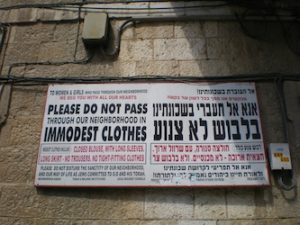The Tzniut Project is a multi-part, multi-author series on the blog Just Call Me Chaviva. It’s a series of answers by women and men from across the observance spectrum – but to be fair, most authors do lean more to the frum side – on what tzniut means to them. All participants are asked the same questions (with some slight variations for gender) about the topic. Each post in the 21 part (and counting) series starts with the anonymous author self-identifying where they fall on the spectrum – from “a proud member of the Conservative Movement” to “a ‘traditional egalitarian’ Jew with a progressive bent and a universalist ethos” to Litvish/Yeshivish to Modern Orthodox and most places in between. The questions deal with both outside appearance and inner thoughts. Here’s an example of the same question answered by three different people:
Question: I say modesty or tzniut … what does that mean to you?
Answer A: Up until about two years ago, I would have only focused on the outside. Now (and probably because I’m trying to break a bad habit of using swear words too often), I focus just as much on words/actions as attire. For me, tzniut is about remembering that G-d created you and showing that you remember by your choice in words/actions/attire.
Answer B: To me it means mode of dress, speech, and actions. Most of the time it comes up on reference to dress, but there have been times between my husband and I where it has come up in actions. I think that over the years asYiddishkeit has evolved and changed there has been a far greater emphasis on tzniut as a mode of dress rather than on speech and actions.
Answer C: At the pshat level, “tznius” refers to a set of halachos governing dress and behavior. The halachos cover, in no particular order, skirt length (or pants length, for men), sleeve length, appropriate necklines, stockings, clothing colors, clothing tightness, jewelry, hairstyles, perfume/cologne, public conduct, appropriate speech, behavior in mixed company…
On a deeper level, the concept of tznius comes from the pasuk in Micha (6:8), which says, “hatznea leches im Hashem Elokecha” — walk modestly with Hashem your God. This is often taken out of context, though — the whole pasuk actually says, “You have been told what’s good, what Hashem demands of you — asos mishpat (do justice), v’ahavas chesed (and love kindness), v’hatznea leches im Hashem Elokecha (and walk modestly with Hashem your God).” [Hey! This is exactly what I wrote in my post, too! Great minds think alike … – Chaviva]
Tznius isn’t just an outfit — it’s a midah, like justice or chesed. To me, tznius means striving to be the kind of person who walks with Hashem, and the clothes I wear are just one part of that — it’s also about being humble, speaking in a refined way, being sensitive to my own privacy and the privacy of others, and knowing the appropriate time and place for everything. It’s about protecting my dignity as a daughter of the highest King.
The series has become a fascinating dialogue both from post to post and within the comments that readers leave. It has challenged me to think differently about what the concept of tzniut means to me as well as some (but not all) of my perceptions about what it means within different sub-groups in the greater Jewish community. And as the heat wave continues, I find myself thinking more often about what it must feel like to be fully covered in these temps.
(Image: Lisa Mathon)





Very interesting, Emily! Thanks for bringing this project to our attention.